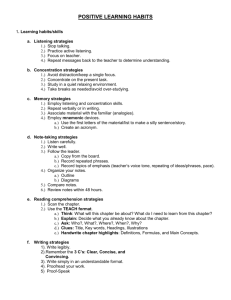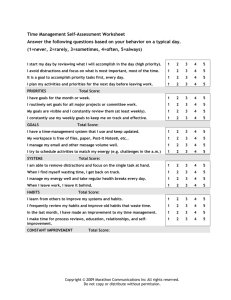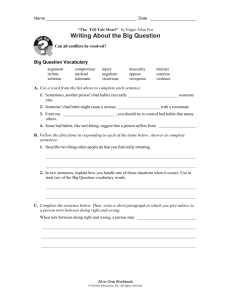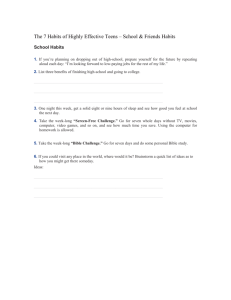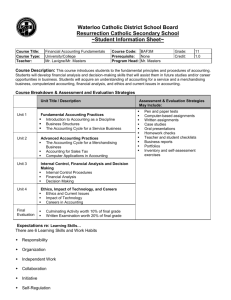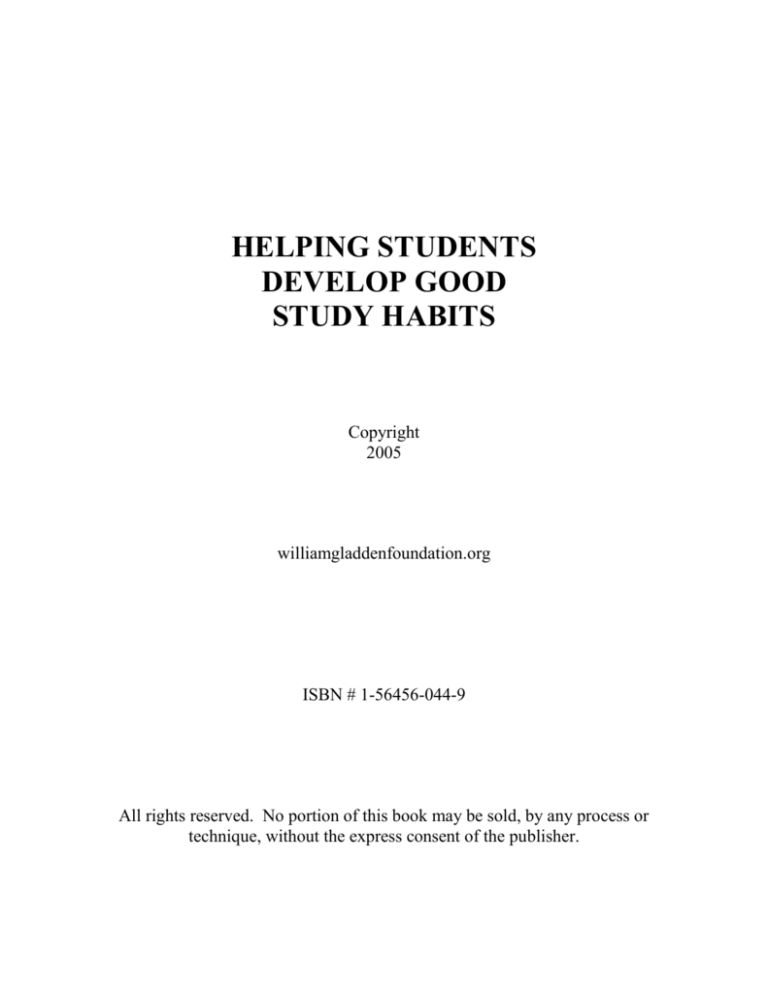
HELPING STUDENTS
DEVELOP GOOD
STUDY HABITS
Copyright
2005
williamgladdenfoundation.org
ISBN # 1-56456-044-9
All rights reserved. No portion of this book may be sold, by any process or
technique, without the express consent of the publisher.
INTRODUCTION
America has come to realize that its national educational system is not reaching enough
of its students. Basic skills at the primary levels of school have decreased, as have the
standard test scores of high school graduates. In addition, there are 23 million illiterate
adults (those whose basic skills are below fifth grade level) and another 35 million semiliterate adults (those whose basic skills are below eighth grade level).
Certainly, the educational system alone is not to blame for this problem. Parents and
communities must bear some of the responsibility. In reality, poor school achievement
has many causes. Family instability can disrupt the support system children need to
concentrate on their studies effectively. Single parents are often too busy with routine
tasks to deal adequately with their children’s school responsibilities. Students frequently
change schools and lose the continuity essential for successful achievement. Many
students have jobs after school and feel overwhelmed by required homework. Some
teachers give routine, run-of-the-mill assignments, scarcely exciting or stimulating
creative thinking. Many educators also neglect to teach students “how to study.”
Poor study habits are a major cause of current academic problems. Too many students do
not know how to study efficiently and effectively. Consequently, they may waste time on
assignments, overlook important facts or give-up before completing assignments.
Furthermore, because they do not understand “how to study,” they may become “turned
off” by the educational process and limit their life-long potential to learn.
It is time to remedy unsatisfactory study habits. It also is time for parents and teachers to
pull together on behalf of children by helping them learn “how to study” efficiently and
effectively. If students are to develop the kind of study habits that improve academic
achievement, the cooperation of home and school will be required. Regular, organized
and consistent study habits can improve academic achievement.
This publication provides an overview of the main problems causing poor study habits,
and possibilities for improvement. It also identifies roles that teachers, parents and
students must play in the study process. We hope that the application of the following
information will result in better study habits and improve academic achievement.
Charlotte G. Garman, Ed.D.
Waln K. Brown, Ph.D.
William Gladden Foundation
-II-
TABLE OF CONTENTS
QUESTIONS AND ANSWERS
Why Is There A Renewed Emphasis On The Development Of Good Study Habits?........4
What Is Meant By “Poor Study Habits?”………………....................................................4
Who Is Responsible For Developing Good Study Habits?.................................................4
Why Don’t Schools Do A Better Job Of Developing Good Study Habits?........................4
Don’t Schools Have A Responsibility To Promote Good Study
Habits Regardless Of The Skills Students Bring With Them?.......................................5
How Can Some Students Have Poor Study Habits Yet Get Good Grades?........................5
What Skills Do Students Require To Study Adequately?...................................................5
When Does Homework Help Develop Good Study Habits?...............................................5
Is Practice Homework Useful In Developing Good Study Habits?.....................................6
When Does Homework Not Help Develop Good Study Habits?........................................6
When Is Required Study An Insult To Students?................................................................6
Does Homework As Punishment Improve Study Habits?..................................................6
How Can Television Help Improve Study Habits?.............................................................7
When Is Television A Detriment To Study Habits?............................................................7
When Should Good Study Habits Begin?............................................................................7
Where Is The Best Place To Study?....................................................................................7
When Is The Best Time To Study?.....................................................................................8
How Much Time Should Be Devoted To Studying?...........................................................8
How Should Students Approach Studying?.........................................................................8
When Do Study Habits Improve?........................................................................................8
DEVELOPING GOOD STUDY HABITS
THROUGH BETTER READING SKILLS…...……………………………….......9
DEVELOPING GOOD STUDY HABITS AT SCHOOL……..…………………….11
DEVELOPING GOOD STUDY HABITS AT HOME…………….……………...…13
HOW TEACHERS CAN HELP STUDENTS DEVELOP
GOOD STUDY HABITS………………………………..………………..……..…14
HOW PARENTS CAN HELP THEIR CHILDREN DEVELOP
GOOD STUDY HABITS..........................................................................................15
PROFESSIONALS TO CONTACT ABOUT IMPROVING STUDY HABITS….16
-III-
WHY IS THERE A RENEWED EMPHASIS ON THE DEVELOPMENT OF
GOOD STUDY HABITS?
National concern about the diminishing test scores achieved by American students has
caused educators and other interested citizens to seek answers to the problem. One of the
findings is simply that many students have mediocre or even poor study habits. A second
finding is that schools need the help and cooperation of parents, families and the general
community to restimulate interest in education and to improve student achievement.
WHAT IS MEANT BY “POOR STUDY HABITS?”
Students who have poor study habits usually read without recognizing meaning or skim
so quickly they miss important facts. They also may be careless, messy in their
paperwork, or tend to overlook or skip problems and tasks. Students with poor study
habits are easily distracted, do not stick to a task, daydream or try to study while
watching television or listening to music. They rarely ask meaningful questions or they
constantly ask questions just to avoid getting to their assignments. Many poor students
have never received help to learn “how to study.”
WHO IS RESPONSIBLE FOR DEVELOPING GOOD STUDY HABITS?
The responsibility for developing good study habits is the equal responsibility of
teachers, students and parents. Teachers should assign only meaningful and achievable
worked geared to the interests, talents and abilities of students. Students must learn the
value of serious study, how to work independently and to manage their time wisely.
Parents should provide a quiet place for study and create an environment conducive to
learning.
WHY DON’T SCHOOLS DO A BETTER JOB OF DEVELOPING GOOD STUDY
HABITS?
It is easy to blame schools for the skills students’ lack, but such blame is misdirected and
incorrect. ACADEMIC EXCELLENCE BEGINS AT HOME. Interest in learning
and the development of good study habits must be instilled in children BEFORE they
come to school. Schools can work only with what parents send them. This is the reason
for the current emphasis on home/school cooperation and joint effort to help students.
-4-
DON’T SCHOOLS HAVE A RESPONSIBILITY TO PROMOTE GOOD STUDY
SKILLS REGARDLESS OF THE SKILLS STUDENTS BRING WITH THEM?
Certainly schools must have a plan for helping those children who bring few skills with
them. Teachers want their students to succeed and, therefore, should treat study habits as
part of any new subject. They often begin the school year by teaching students how to
study and how to do homework. Good teachers will solicit the help of parents whenever
possible. Nonetheless, it is up to parents to create an environment conducive to learning
and it is the responsibility of students to follow through.
HOW CAN SOME STUDENTS HAVE POOR STUDY HABITS YET GET GOOD
GRADES?
Some students may do acceptable work in a structured learning environment where a
teacher directly supervises them. However, when these same students are left to organize
their own time or put forth extra effort to improve their work, they usually do not perform
as well. Some schools are so structured that students have little or no chance to work on
their own and to develop good study habits independently.
WHAT SKILLS DO STUDENTS REQUIRE TO STUDY ADEQUATELY?
All students must develop the ability to work independently without teachers or other
adults present. Working independently requires self-discipline. Self-discipline involves
willpower, concentration, the ability organize work and to use time wisely. These skills
are sometimes difficult to develop in many homes, and students need frequent praise and
encouragement to achieve them. This is another reason for the emphasis on schools and
homes working together to help students.
WHEN DOES HOMEWORK HELP DEVELOP GOOD STUDY HABITS?
Homework is worthwhile when it promotes skills such as curiosity, the capacity to read
and think carefully and the ability to use time wisely. It also is worthwhile when it
encourages interest in learning about new subjects and when it helps students discover
and use the wide array of resource materials on almost any subject. Homework is
perhaps most valuable when it improves the learner’s self-esteem. Self-esteem improves
when students can successfully complete the required work. When students learn they
can successfully complete homework, their study habits improve automatically.
-5-
IS PRACTICE HOMEWORK USEFUL IN DEVELOPING GOOD STUDY
HABITS?
YES, there are times when students need practice. Not everything can be learned quickly
in school, so homework can reinforce what a teacher has introduced in the classroom.
The potential problem with this lies in the fact that some teachers may assign too many
practice exercises as homework. They may ask students to do 100 math problems when
only 10 or 20 would be enough. It really is important to remember that students have
worked all day in school and should not have to work all evening at home. Good study
habits develop in relation to the delicate balance between what is doable and what is
required.
WHEN DOES HOMEWORK NOT HELP DEVELOP GOOD STUDY HABITS?
Homework for bright students who already have mastered a skill or assignment is boring
and misuses time better spent in reading or researching a new area of study. Homework
requiring excessive repetition of the same skill makes students weary and causes them to
lose interest. Homework that dulls curiosity rather than arousing it weakens study
attitudes and habits. Homework that is difficult to complete successfully lowers selfesteem and jeopardizes good study habits.
WHEN IS REQUIRED STUDY AN INSULT TO STUDENTS?
Mere busywork with too much repetition tries the mental health of students. It turns off
their enthusiasm and does little stimulate learning. Such required study is usually a
source of contention between parents who insist that children finish the assignment and
students who dawdle rather than do the repetitious tasks. Some assignments are too
vague or too broad in scope and leave students wondering what really is expected of
them. This causes wasted study time and confuses students and parents. The resulting
confusion in no way improves study habits.
DOES HOMEWORK AS PUNISHMENT IMPROVE STUDY HABITS?
NO, homework as punishment does not improve study habits; rather, it can have the
opposite effect. Homework used as punishment can confuse students by making the
positive experience of learning a negative event. Students who come to view learning as
a negative event are in danger of decreasing their studying or of developing ineffective
study habits.
-6-
HOW CAN TELEVISION IMPROVE STUDY HABITS?
Television can be a valuable tool of learning – when it deals with the real world. It can
portray people around the earth, their ways of living, cultures, customs and communities.
Television also can bring instant news of world events and show students much that they
might never experience otherwise. Television programs that provoke thought,
communicate a meaningful message and help students to gain a better understanding of
the world they live in can heighten curiosity and stimulate the learning process. To
improve study habits, however, television programs should have specific goals for
students to discover and remember. Mere viewing without real purpose does little to
improve study habits.
WHEN IS TELEVISION A DETRIMENT TO STUDY HABITS?
General television viewing, with its stress on violence, sex, disaster and unreal situations,
should be prohibited during study time. Such television adds nothing to the emotional
well-being of students and can only detract from the quality of their study. Young people
who argue that they can “study better” when watching television are really just trying to
make the task more pleasant. Study takes deep concentration, not half-hearted attention.
Furthermore, students can complete their homework more quickly and more accurately
when they are not also watching television.
WHEN SHOULD GOOD STUDY HABITS BEGIN?
Good study habits begin the first time an adult reads to a child. Learning to listen to a
story, discussing it and remembering details are important beginnings of developing
“good study habits.” In nursery school, daycare or kindergarten, children continue to
develop good study habits by completing small tasks on their own, by following simple
directions, by deciding how to do little tasks and by building an enthusiasm for learning.
Good study habits grow each year of school, when children have positive attitudes and
when schoolwork is challenging but not overwhelming. They also grow when their
honest effort is praised and rewarded frequently.
WHERE IS THE BEST PLACE TO STUDY?
Most homes can provide a quiet place with good lighting and a desk or table upon which
to work. This can be in the student’s room, in a den, a study, a dining room or in any
place that is away from noise and activity. Younger children, of course, will want to be
near parents for security and help. The important thing is to provide a place where
students can concentrate without interruption. The telephone, television, music and other
outside influence should be strictly “off-limits” during the time set aside for study.
-7-
WHEN IS THE BEST TIME TO STUDY?
The best time to study depends on the student in question. Since individuals differ, their
best time for study also may differ. Some students work best during the morning, while
others work better later in the day or during the evening. Students should have study
time set aside WITHIN their most productive time periods. For example, students who
are “morning people” might plan to become early risers and study before school begins.
This eliminates spending unproductive time at night when their energy is low.
HOW MUCH TIME SHOULD BE DEVOTED TO STUDYING?
Remember that the ability to complete an assignment differs from student to student.
Some students will complete their assignments before the school bus arrives home, others
will struggle for an hour after supper and still others may require more time. Generally,
however, students from kindergarten through third grade should devote 15 to 20 minutes
to studying, students from grades four through six can usually cope with 30 to 40 minutes
and more time for older students according to their abilities to master their homework
without experiencing stress.
HOW SHOULD STUDENTS APPROACH STUDYING?
Students should begin by reviewing the day’s assignments. This provides an overview of
what must be done and helps the student to allot the necessary time for completing each
task. Fifteen to 20 minutes per assignment is usually adequate. However, this depends
on the age, attention span and ability of the student. Because short periods of study are
more productive than are long stretches, students should take periodic brief breaks. A
snack also may provide instant energy. Fruit or juice, rather than “junk food,” is a good
choice for quick energy.
WHEN DO STUDY HABITS IMPROVE?
Study habits improve when assignments do the following: 1) build self-esteem, 2) extend
skills, 3) encourage imaginative thinking, 4) introduce new concepts, 5) build research
skills, 6) improve reasoning skills, 7) require inferential thinking, 8) correct wrong
concepts, 9) demand minimal repetition and 10) challenge natural ability.
-8-
DEVELOPING GOOD STUDY HABITS THROUGH
BETTER READING SKILLS
When students are assigned specific material to study, they are usually asked to do so for
the following reasons: 1) to gain information, 2) to solve a problem, 3) to practice a skill
or 4) to obtain pleasure from the assignment. How students approach an assignment will
depend on the purpose for doing it. The rate at which a student can read is a big help no
matter what the purpose of an assignment. As a rule, the more rapid readers will be able
to complete assignments with greater ease, but this should not deter slower readers. Fast
or slow, each student can accept the following plan to complete an assignment. For
effective study, all forms of reading will be necessary at some time in the course of an
assignment. Students who learn to follow through with the following four kinds of
reading also will find their study skills much improved and the results more gratifying.
SKIM
READING
SPEED
READING
SLOW
READING
REFLECTIVE
READING
SKIM READING – The purpose of skim reading is to 1) get an overview of what is
expected, 2) quickly locate information, 3) discover the main idea of what happens next,
4) plan how much time will be required to complete the work and 5) think how to
organize the tasks involved in the assignment.
SPEED READING – For anything other than mathematical problems, it is helpful to
read very rapidly to get main ideas, general concepts or the basic meaning of the assigned
materials.
SLOW READING – Everyone needs to read for understanding and for remembering
details. Slow reading also is essential for organizing, getting ready to present to others, to
recite or to explain. For tests, slow reading for details and memorizing is vital.
REFLECTIVE READING – This form of study is necessary to follow directions, to
perform experiments, to evaluate content, to enjoy privately or to read aloud to others.
-9-
DEVELOPING GOOD STUDY HABITS
AT SCHOOL
Students who develop good study habits at school increase the potential to complete their
assignments successfully and to learn the material they are studying. They also reduce
the possibility of not knowing what is expected and of having to spend time studying at
home.
LISTEN CAREFULLY WRITE DOWN USE STUDY HALLS BRING HOME
TO ASSIGNMENTS ASSIGNMENTS & STUDY PERIODS ASSIGNMENTS
LISTEN CAREFULLY WHEN ASSIGNMENTS ARE GIVEN – All students must
be sure of their actual assignments. This requires carefully listening to the teacher and
understanding what exactly is expected. Such careful listening is the first step toward
developing good study habits and may be the most important.
WRITE DOWN SPECIFIC ASSIGNMENTS – Every student should keep a notebook
of assignments. Putting notes on scraps of paper is poor practice because they are easily
lost. Trying to remember exact assignments also can be a mistake because page numbers,
important instructions and other information can be confused or forgotten.
USE STUDY HALLS AND STUDY PERIODS WISELY – Every school or class
provides study halls or study periods. When students use study halls and study periods
wisely, many assignments can be completed or started in school. This reduces or
eliminates homework.
BRING HOME ALL BOOKS AND MATERIALS NOT COMPLETED IN
SCHOOL – Be sure to bring home assignments not completed at school. Bring home
assignments that need checked or reviewed. Establish the habit of being thorough in the
completion of assignments.
-10-
DEVELOPING GOOD STUDY HABITS
AT HOME
Students who develop good study habits at home also increase the potential to complete
their assignments successfully and to learn the material they are studying. Furthermore,
they also can reduce the amount of time spent on homework.
CHOOSE A PLACE
TO STUDY
ALLOT TIME FOR
EACH ASSIGNMENT
SELECT A TIME
TO STUDY
BEGIN
ASSIGNMENTS
REVIEW COMPLETED
WORK
ELIMINATE
DISTRACTIONS
TAKE
BREAKS
REVIEW
ASSIGNMENTS
EAT A HEALTHY
SNACK
ASK FOR HELP
WHEN NEEDED
CHOOSE A PLACE TO STUDY – A quiet place with good lighting is best. The study
area should be away from distractions and allow uninterrupted concentration.
SELECT A TIME TO STUDY – Students should have study time set aside WITHIN
their most productive periods. This may mean early morning for some students and later
in the day for others.
ELIMINATE DISTRACTIONS – Good study habits require concentration.
Distractions such as visitors, television, loud music and the telephone should be offlimits.
REVIEW THE DAY’S ASSIGNMENTS – Going over the day’s assignments helps
students recall the assigned work and plan how much time is required to complete each
task.
-11-
ALLOT TIME FOR EACH ASSIGNMENT – Allot short periods for each assignment
unless one demands special attention. Short periods require the student to concentrate on
the current task and to reduce boredom.
BEGIN ASSIGNMENTS – Begin completing assignments one at a time. Completing
the easiest assignments first will allow more time for the harder ones. However, students
should determine the order of completing assignments according to what is most logical
and comfortable for them.
TAKE BREAKS – Take periodic, short breaks from study. A brief stretch or walk
around the house helps to relieve tension, renew energy and provides a lift for the
remaining study.
EAT A HEALTHY SNACK – Fruit, juice or hard candy provide quick energy and can
help the student remain focused. Study time should not be for devouring junk food or for
indulging in messy snacks. However, a healthy snack can provide the extra energy
required to complete assignments successfully.
REVIEW COMPLETED WORK – During study, it is helpful to stop work and to
review progress. This permits checking for errors and omissions. It also provides an idea
of how the student is progressing with the day’s assignments.
ASK FOR HELP WHEN NEEDED – Every student needs help occasionally. The
younger the student, the more frequent this may occur. It is important not to give the
student exact answers, but to guide with questions and suggestions. Only if the student is
experiencing frustration should the adult help the student find the answer.
-12-
HOW TEACHERS CAN HELP STUDENTS DEVELOP
GOOD STUDY HABITS
The following is a list of ways teachers can help students develop good study habits and
benefit from the total educational experience. Teachers should be concerned about all
students and try to give them the kind of “road map” that will make studying more
efficient and effective.
Assume that students do not know how to study effectively and show them how to
do homework and in-school study
Treat homework and study habits as a subject
Clarify everyone’s role in the study process - students, parents and teachers
Put in writing how much you value homework and good study habits
Emphasize how often you expect homework to be done
Explain how you expect homework to be done
Explain the consequences of not completing assignments
Explain the rewards of completing homework
Inform parents of your homework policies
Explain to parents how you expect their support
When problems arise, discuss them with your students
Change your policies only if there are serious problems that seem to be affecting
student self-esteem or morale
Correct homework and review errors with students
Try to match assignments with each student’s most productive learning style
Discover the perceptual strength of students and whether they learn best through
what they hear, see, touch or apply
Find the time of day when the student works best
Match the time of day and the student’s best learning style to achieve the most
effective studying
Make homework meaningful and not just “busy work”
Give one achievable assignment, since study that is too difficult only defeats the
purpose of homework and other special assignments
-13-
HOW PARENTS CAN HELP STUDENTS DEVELOP
GOOD STUDY HABITS
Parents who are genuinely interested in their children’s school progress can provide help
at home and through school. An article in AMERICAN EDUCATION suggests the
following helpful hints.
Discover whether the child works best under supervision or alone
Find out whether the child can organize time wisely
Discover whether the child does homework on the bus, in study halls, in a brief
classroom period or at home
Check homework carefully to see how well it is completed
Inquire from teachers and the child about assignments
Ask for reading requirements and written standards of work
Visit the teacher to get an idea about the teacher’s personality and expectations
Keep regular communication with the school
Set parental standards and ask the child to meet them
Check the child’s ability through outside testing and compare the findings with
the school’s test results
Expect good work from your children because you will get largely what you
expect
Support what the school is trying to do for your child
Show flexibility and thus help your child to adapt to the challenges of life
Insist on good study habits at home
Realize that excellence at school must begin at home
Observe the continuing quality of your child’s work
Encourage the child to use free time by reading a book, magazine, even comics
Ask children to speak in full sentences, not in mumbled, one syllable responses
Require the child to redo sloppy work
Determine to help your child establish good study habits and stick to it
Praise very improvement and honest attempt
-14-
PROFESSIONALS TO CONTACT
ABOUT IMPROVING STUDY HABITS
The following is a list of professionals to contact about students who have inadequate
study habits. To determine which of these professionals can best help the student, it may
be wise to ask the school principal for advice.
SCHOOL PRINCIPAL – The school principal should be able to provide the specific
information or service, or direct you to the professionals who may prove helpful in
improving study habits.
Telephone #
SCHOOL GUIDANCE COUNSELOR – School guidance counselors are trained to
help students with personal and academic problems. They also are knowledgeable about
how to improve study habits.
Telephone #
SCHOOL PSYCHOLOGIST – Not every school district employs a school
psychologist, but every district should be able to make a referral to a psychologist in
private practice. A psychologist may need to administer tests to determine how best to
help improve a child’s study habits.
Telephone #
COUNTY OFFICE OF EDUCATION – Every county has an office of education that
maintains psychologists and guidance staff to assist with problems such as poor study
habits.
Telephone #
CHILDREN AND YOUTH AGENCIES – These agencies have advisors and
counselors skilled in helping with problems associated with children and their families.
They specialize in a variety of issues involving children at home and in school.
Telephone #
PRIVATE EDUCATIONAL ASSISTANCE AGENCIES – Most communities have
private educational assistance agencies. For a fee, they will test a student and
recommend a course of action to help resolve the student’s educational problem.
Telephone #
-15-

